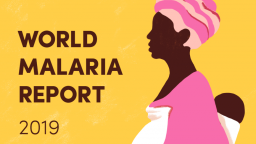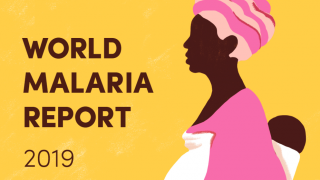The World Malaria Report 2019 is here
The annual World Malaria report from the World Health Organisation is the most up to date summary of data on the fight against malaria. The 2019 report, released today, shows that despite an unprecedented decline in the global malaria burden between 2000-2015, overall rates of progress have plateaued for a third year running.
Pregnant women and children in Africa continue to bear the brunt of this epidemic, with children under the age of five accounting for two thirds of global malaria deaths in 2018. The countries with the heaviest burden of malaria continue to face the most challenges, with over half of all malaria cases concentrated in just six African countries – Nigeria, DRC, Uganda, Cote d’Ivoire, Mozambique and Niger.
We have the knowledge and the power to defeat malaria. Now, we need to step up action and innovation to make a malaria-free world a reality.

However, there is also cause for optimism. More countries than ever nearing the goal of zero malaria - including Malaysia, China, and El Salvador. 27 countries reported less than 100 cases in 2018, up from 17 in 2010, and four more were certified as malaria-free by the WHO in 2018 and 2019 – Algeria, Argentina, Paraguay and Uzbekistan.
Whilst the report highlights progress in two key high burden countries – India and Uganda – it emphasises the need for accelerated action across all malaria endemic countries. Again there are reasons to be optimistic – the Global Fund replenishment in October this year will see increased funding and resources to fight malaria and strengthen health systems over the next three years.
Political leadership is being shown through national and international commitments, such as the 2018 commitment to halve malaria across the Commonwealth by 2023. Next year will offer leaders the first chance to review progress towards this target at the 2020 Commonwealth Heads of Government Meeting in Kigali, Rwanda. British government, civil society, science and businesses are playing a vital role in supporting initiatives.
From the UK’s £1.4 billion pledge to the Global Fund, to helping to secure the Commonwealth commitment last year to halve malaria by 2023, the UK government has demonstrated that it is committed to driving progress. It is vital that we channel all of our efforts to ramp up global innovation, political action from malaria endemic and donor countries and sustainable investment in research and development for new malaria-fighting tools, or face slipping down the slope of resurgence.
Now, more than ever, we need to accelerate progress in the fight to end malaria. What we need is the right tools, in the right place at the right time, to ensure that we will be the generation that ends malaria for good.



